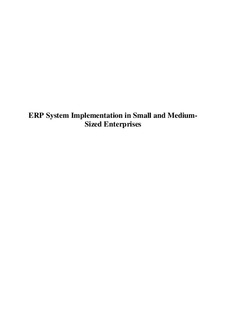| dc.contributor.author | Zach, Ondrey | |
| dc.date.accessioned | 2012-09-24T08:43:42Z | |
| dc.date.available | 2012-09-24T08:43:42Z | |
| dc.date.issued | 2012 | |
| dc.identifier.isbn | 978-82-7117-714-0 | |
| dc.identifier.issn | 1504-9272 | |
| dc.identifier.uri | http://hdl.handle.net/11250/136206 | |
| dc.description | Doktorgradsavhandling i informasjonssystemer, Universitetet i Agder, Kristiansand, 2012 | no_NO |
| dc.description.abstract | This thesis presents a study of Enterprise Resource Planning (ERP) system
implementation in small and medium-sized enterprises (SMEs). Compared to large
enterprises, SMEs represent fundamentally different environments, with a number of
characteristics typifying the SME context. Because of these distinguishing differences,
the findings from studies of ERP implementation in large enterprises cannot be fully
applied to SMEs. The purpose of this research project is to explore the influences of
the SME context on the ERP system implementation, addressing the following overall
research question: How does the SME context affect ERP system implementation? The
implementation term in this thesis refers to the entire ERP life-cycle, denoting the
complete implementation process.
A qualitative exploratory research approach is applied to answer the research question.
The research is conducted through a combination of literature review and case study
research. The empirical part comprises a multiple case study of ERP implementation
in four SMEs. All four case organizations are privately owned SMEs in the Czech
Republic.
The research strategy applied is to investigate influences of the contextual factors on
various activities across the ERP life-cycle. A list of characteristics, which typify the
SME context and could potentially influence on ERP implementation, is synthesized
from relevant literature. The SME characteristics are grouped into three contextual
dimensions: organizational, environmental, and technological. Then, the influences of
the SME characteristics on various activities across the ERP life-cycle are explored.
To organize the findings, a six stage model of the ERP-life cycle is adopted. A detailed
cross-case analysis is conducted, identifying similar and contrasting findings between
the cases.
The research results are presented in five articles published in international conference
proceedings and journals. The purpose of this thesis summary is to integrate and
discuss the results presented in the publications in a coherent way.
The thesis contributes to four research areas. First, the study contributes to the research
stream on contextual influences on ERP system implementation, with particular focus
on the influence of the SME context. The ownership type and limited resources were
identified as the most influential characteristics of the SME context. Furthermore, an
early stage of organizational growth and obsolete legacy systems influenced several issues. | no_NO |
| dc.language.iso | eng | no_NO |
| dc.publisher | University of Agder, Faculty of Economics and Social Sciences, Department of Information Systems | no_NO |
| dc.relation.ispartofseries | Doctoral dissertations at University of Agder;51 | |
| dc.title | ERP system implementation in small and medium-sized enterprises | no_NO |
| dc.type | Doctoral thesis | no_NO |
| dc.subject.nsi | VDP::Social science: 200::Economics: 210::Business: 213 | no_NO |
| dc.subject.nsi | VDP::Technology: 500::Information and communication technology: 550 | no_NO |
| dc.source.pagenumber | 1 v. | no_NO |
